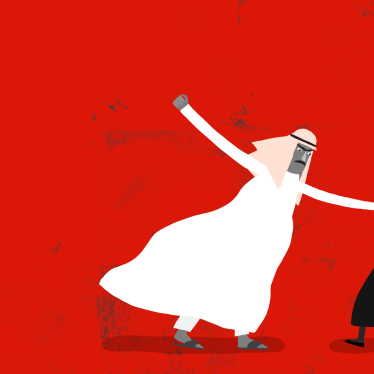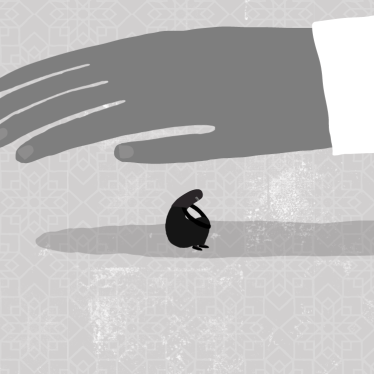(Beirut) – Saudi Arabia announced an end to its high-profile anti-corruption campaign on January 31, 2019, but some of those rounded up remain in detention without a clear legal basis, Human Rights Watch said today. Saudi Arabia carried out the mass arrests, including of princes, current and former government officials, and prominent businessmen, on November 4, 2017, holding some for months at Riyadh’s five-star Ritz Carlton Hotel and forcing them to turn over assets in exchange for their freedom outside of any legal process.
Those who remain in detention without clear legal status include Prince Turki bin Abdullah, the former governor of Riyadh and son of the late King Abdullah; Prince Turki’s associate Faisal al-Jarba; Prince Salman bin Abdulaziz bin Salman and his father, Prince Abdulaziz bin Salman bin Mohammad; and a former planning minister, Adel al-Fakieh. Saudi authorities should immediately clarify whether those in detention face charges in connection with the anti-corruption campaign or for other recognizable criminal activity, and if not, the authorities should release them immediately.
“Crown Prince Mohammad bin Salman has justified the so-called corruption arrests as ‘shock therapy’ for the Saudi economy, but what’s truly shocking is to shake down prominent Saudis without giving them any chance to defend themselves,” said Michael Page, deputy Middle East director at Human Rights Watch. “Holding detainees without charge or trial for 16-months only reinforces the reality that the Saudi corruption campaign has taken place completely outside the rule of law.”
Saudi Arabi’s official Saudi Press Agency (SPA) released a royal court statement on January 31, saying that the anti-corruption committee, led by Crown Prince Mohammad bin Salman, had “concluded its tasks” after summoning 381 people to give evidence.
The statement said that those not indicted on corruption charges had been released, while 87 had agreed to settlements and 56 had been refused settlements because they faced other criminal charges. The statement said that the authorities had referred 8 others to the public prosecutor after they refused to settle. The statement concluded that “more than SR400 billion (US$107 billion) was retrieved to the state treasury in the form of real estate, companies, cash, and other assets.”
An informed source told Human Rights Watch that Prince Salman bin Abdulaziz and his father, both businessmen, have remained in detention without charge or trial since their arrests in January 2018. They are in al-Ha’ir Prison, south of Riyadh. Prince Salman bin Abdulaziz is married to a daughter of King Abdullah.
The source said that Prince Salman believes he was detained in retaliation for his advocacy on behalf of his detained family members after the November arrests. To the source’s knowledge, the authorities did not freeze Prince Salman bin Abdulaziz or his father’s assets or ask for financial settlements.
Another informed source told Human Rights Watch that Faisal al-Jarba, the confidant of Prince Turki bin Abdullah, remains in detention without charge. The Washington Post reported that in June, the Jordanian authorities had detained al-Jarba in Amman, where he had fled to seek safety, and eventually drove him to the Saudi border and handed him over to Saudi authorities. Prince Turki also remains in detention without charge, the source said.
Others still held under opaque circumstances include al-Fakieh and Prince Khalid bin Talal.
Those detained in November and subsequently released include Prince Alwaleed bin Talal, chairman of Kingdom Holding Company; Prince Miteb bin Abdullah, former head of the Saudi National Guard; Waleed al-Ibrahim, former chairman of MBC Group; and other influential businessmen – Saleh Kamel, Amr Dabbagh, and Mohammed Hussein al-Amoudi. Another former briefly detained minister, Ibrahim al-Assaf, was appointed foreign affairs minister in December. Bakr Binladen, former chairman of the Binladin Group, was temporarily released in unclear circumstances in January.
A March 12, 2018 New York Times report said that 17 Ritz Carlton detainees required hospitalization for physical abuse. They included Maj. Gen. Ali al-Qahtani, an aide to Prince Turki, who later died in custody, the report said, “with a neck that appeared twisted [and] a badly swollen body and other signs of abuse.” The report cited a person who saw the body, which in addition to a twisted neck, had burns that appeared to be from electric shocks.
International human rights law protects basic rights, including the right not to be arbitrarily detained. Any charges authorities bring must resemble recognizable crimes. At a minimum, those detained should be informed of the specific grounds for their arrest, be able to fairly and promptly contest their detention before an independent and impartial judge, have access to a lawyer and family members, and have their case periodically reviewed. Those detained in connection with an alleged crime should be promptly informed of any charges against them.
Holding detainees at unofficial detention centers also violates international standards. The United Nations Human Rights Committee, in its general comment on article seven of the International Covenant on Civil and Political Rights (ICCPR), stated that “…provisions should be made for detainees to be held in places officially recognized as places of detention and for their names and places of detention, as well as for the names of persons responsible for their detention, to be kept in registers readily available and accessible to those concerned, including relatives and friends.” While Saudi Arabia has not ratified the ICCPR, it constitutes authoritative sources and guidelines that reflect international best practice.
“Mohammad bin Salman’s government’s record of lawlessness is clear, and this denial of basic rights in their corruption campaign should be seen in that light,” Page said. “Instead of a good faith attempt to tackle an important issue, Saudi authorities have scorned due process to which all citizens have a right.”








